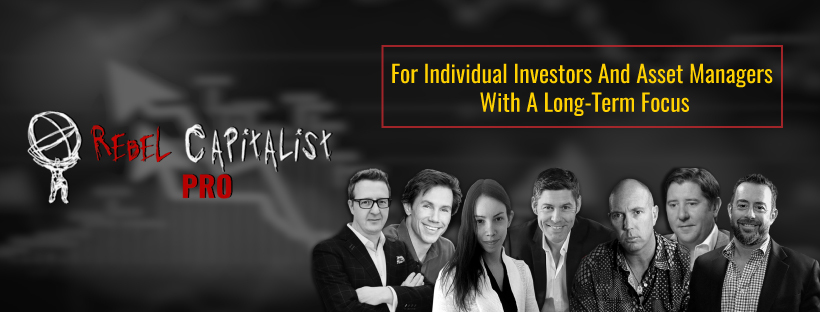My interview with Danielle DiMartino Booth
She is the founder and CEO of Quill Intelligence, a revolutionary research firm delivering market intelligence in a redefined way: with no agenda or bias.
She was a Fed insider for nine years where she worked at the Federal Reserve Bank Of Dallas and is also the writer of the book Fed Up: An Insider's Take on Why the Federal Reserve is Bad for America.
Today she is a thought leader on monetary policy, economics, and finance.
In this interview, we discuss some Fed’s insights, monetary policy, real estate, pension crisis, gold, silver, and Bitcoin. So, get comfortable because you’re going to want to hear her.
The Fed: an Allegory of Want
"At the root of the Fed’s failings is the absence of an adapted monetary policy Hippocratic Oath. Alas, “First do no harm” is a foreign concept to central bankers, even if doing nothing ultimately saves the patient."
https://t.co/eliO8k29No pic.twitter.com/XK4h7UEQvg— Danielle DiMartino Booth (@DiMartinoBooth) June 11, 2020
Fed’s Internal Policy
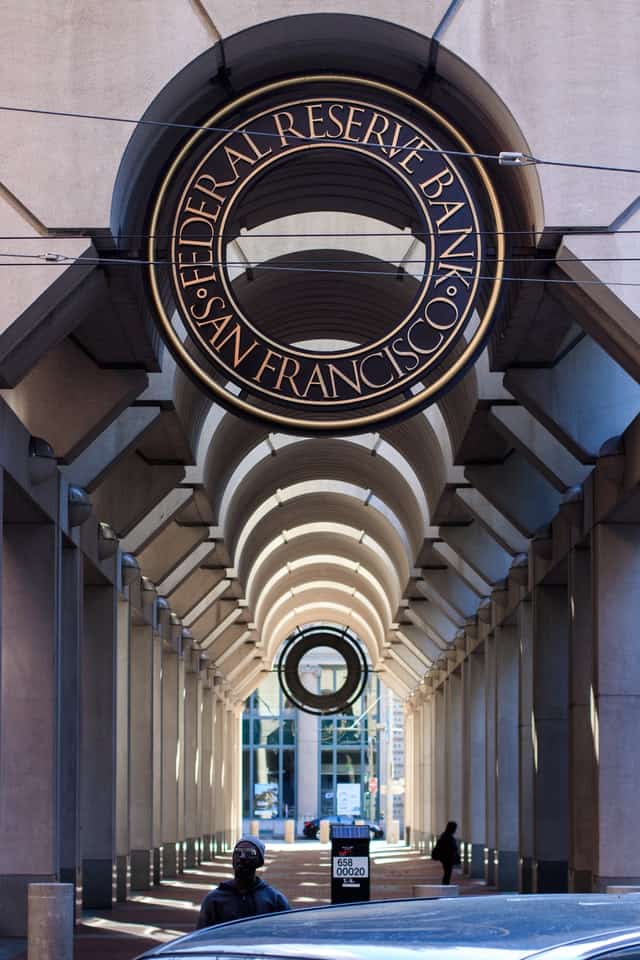
George: All right, guys. It gives me a great deal of pleasure to bring someone to the Rebel Capitalists Show, that I have a tremendous amount of respect for.
She is my sister's favorite macro thinker. That's right. She really needs no introduction.
Her name is Danielle DiMartino Booth. Danielle, welcome to the Rebel Capitalist Show.
Danielle DiMartino Booth: Awesome to be here. Let's get the rebel roar going.
George: That's right. Okay. So let's dive right into it.
I know you are an insider with the Fed. Most of my viewers know that. So the first thing I'd love to talk about is:
When the Fed is setting up a policy, are they doing it based strictly on models, and ignoring everything else?
Because that would explain to me why central banks, as an example, have taken interest rates negative when it's pretty obvious that it doesn't work.
But if they're just really hyper-focused on their models, then it might make sense. Can you expand on that?
Danielle DiMartino Booth: They still do, from what I can tell from the outside looking in, rely on those models. They think in basis point increments.
If we get to the zero bound, how can we synthetically create 25 basis points of easing?
A lot of them, a lot of the models, the white papers, and the studies that came out during the first iterations of QE said every $250 billion equates, to more or less, a quarter-point easing.
It worked the same way with … Not that they admitted it, but their model actually worked really well with quantitative tightening on the way down.
So they're like, “So we're going to print $250 million. We're going to give you a quarter-point of easing.”
“Every time we do that, we're going to blow up the balance sheet, but when we try and exit, it's not going to count.”
So it won't be double tightening, even though we all found out that it was double tightening.
Very few people right now are talking about what the Fed is doing today and how difficult it was for them to exit just a few years ago, and what that means going forward.
George: Yeah. Okay. So let's dive into that. I didn't even have that as a talking point, but that's really interesting, and I've addressed that a couple of times in a few of my videos.
So the Fed takes their balance sheet, I think it's around seven right now, to 10 trillion, 20 trillion, wherever it's going.

How do they reverse course? And if they can't reverse course, what does that mean for inflation, if we do have a recovery?
Danielle DiMartino Booth: Well, that was a lot of ifs. The thing is there is this underlying theory … If you listen to Powell, he is adamant.
We can grow this (The Fed's balance sheet) as big as we want, inflation is not an impediment. To listen to him (Jerome Powell), inflation's never going to be an impediment. So you can go from seven to 10 to 20 and nothing is going to happen.
Well, I just wrote 4,000 words on China and how tenuous the situation is, and if you look at flows, international flows, the Fed's been the only buyer of late.
International purchases and treasury auctions have come down a lot.
So inflation becomes a phenomenon when the Fed backs away and assumes that the vacuum that they leave is going to be filled by former buyers.
If that doesn't happen or if they say, “These crazy yanks have printed so much money, that enough is enough, we're going to demand more in terms of a coupon.”
Then you get inflation, and you can actually get higher interest rates. I mean, it doesn't exist in an economics textbook, but neither do I.
But you can actually get higher interest rates at the same time you've got sclerotic growth, and that's the worst possible outcome.
George: Yeah. So that takes us back to the 1970s or something similar to that.
I've always thought through that or tried to, and I asked myself, “Okay, if the Fed's tools are basically creating more bank reserves, or taking interest rates artificially low,” if you want to call it that.
And then hoping the commercial banks, the primary dealers, do something with that money to either increase asset prices or hopefully get it into the real economy, which doesn't happen too often.
Danielle DiMartino Booth: If we print it, they will borrow. They've never figured out that it doesn't work that way. It's not a seamless process.
Why Are We Not Seeing Inflation In Our Economy?
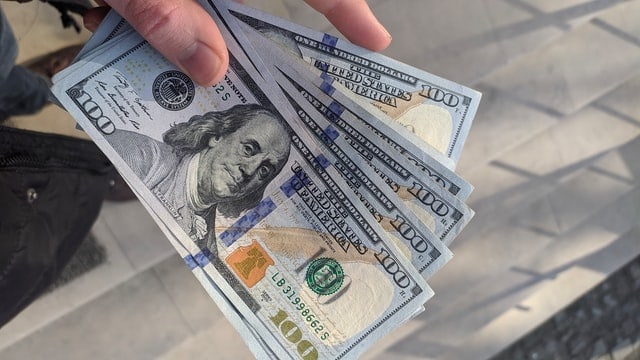
George: Yeah, that's right.
Well, maybe you want to expand on that a little bit. I think some of my viewers get caught up on that point that if the Fed is creating all of these bank reserves, so call it $7 trillion…
Why are we not seeing inflation in the real economy?
Danielle DiMartino Booth: Well, in order to see inflation, you'd have to have appreciable growth.
I mean, take COVID-19 out of the equation. You had negative global trade in 2019, for the entire year. We didn't see that in '90, '91. We didn't see that in 2000, 2001. Those were shallow quick recessions.
But we saw it in the '80s and we saw it in 2007, 2009, the economy was slowing.
Jamie Diamond, Brian Moynihan, they're all saying the consumer's strong, blah, blah, blah, but they're not lending. Again, this is pre-COVID.
So banks were already starting to batten down the credit hatches, even though the Fed was doing not QE, and trying to encourage them to lend. A banker is always going to be a banker, and if a banker sees credit risk, it doesn't matter. It doesn't matter what they charge, they're not going to make the loan.
George: Right, and if they don't make the loan, then it doesn't increase the money that's in the real economy.
Danielle DiMartino Booth: No.
George: And velocity potentially decreases.
Danielle DiMartino Booth: Right. That's the thing.
You get velocity hitting a wall and you can't generate that inflation. So all you have is more debt to service, which perversely creates deflation.
How Does The Fed Measure The Money Supply?
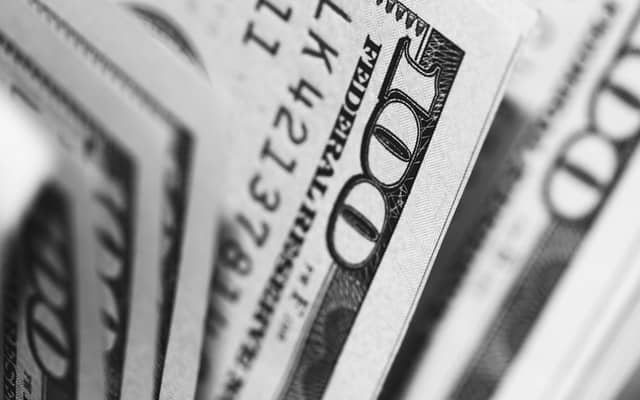
George: Yeah. Right. Okay.
Going back to M2, how is that measured?
The reason I'm asking this question is because I'm trying to figure out why velocity has gone down so much since 2008, while at the same time M2 has increased so much.
Danielle DiMartino Booth: Well, it's a simple matter of battening down the hatches.
I mean, we've seen the phenomenon that you're describing on steroids with companies and households setting aside more money than they ever had. This is like a mafia movie.
Everybody's going to the mattresses. They're putting aside as much liquidity as they possibly can.
If you look at the highest tier of income earners in the University of Michigan data, they're saying that their incomes are not going to rise 12 months out.
So people with the means to spend are saving as much as they can. You're seeing cash deposits rise.
You're seeing people hoarding currency around the world.
The more fear you get, the more you're going to end up building that M2 because people are worried about what tomorrow's going to bring.
So bankers aren't lending and people are saving, and this is toxic in terms of generating economic growth.
You don't get the velocity or any movement in the economy, and that makes people even more afraid. So it's the paradox of thrift playing out in real-time.
George: Right, and going to that, the Keynesians would argue, “Hey Danielle, well, we just need to print more money.
We need to print, we need to do UBI, we need to do helicopter money.”
Why is that not the thing to do in that case?
The Central Bankers Endgame: Debt Jubilee

Danielle DiMartino Booth: Then you will get inflation.
See, the thing is, and I'm going to just cut, right into it. There's no foreplay. We're just going straight to debt jubilee.
If you want to get to what every central banker’s wet dream is, that was not politically correct either, you get to the debt jubilee but only on the sovereign side.
Because you can't do a debt jubilee in a private banking system. That's a no-no. You can't just expunge debts.
But even saying that you're going to get to the end game, we're going to go from 25 to 30 trillion, we're going to take it to $60 trillion.
It's going to be a universal basic income, Medicare for all, everybody's going to get to go to college for free so they can all have useless valueless degrees and everybody gets a pony, and it's going to be so awesome.
Then you get inflation, and then you get so much deficit spending that other nations are like, “Uh-uh, sorry.”
That is when currency wars can segue into hot wars.
That is when, if you look back through time, Portugal, Spain, the United Kingdom, and the loss of reserve currency status, it's if you push the envelope too far, then you get pushed back.
So if we have something like a debt jubilee necessitate itself, such that all of the major debtor nations around the world need to get rid of their debts and just wipe the decks clean, you have to have all countries go along with the plan.
George: Right.
Danielle DiMartino Booth: Yeah, everybody has to agree.
The last check, the second-largest country in the world that is under siege right now probably wouldn't agree.
They would probably see that as the opportunity to unseat the dollar because they're really long forward-thinking types.
So the debt jubilee that central bankers think is the eventual end game, the eventual outcome, that we're just going to wipe it clean, can't work unless you have kumbaya global serenity.
No geopolitical tensions at all, no presidents calling it the China virus, 116 nations backing Australia calling for an international inquiry into the coronavirus' origins.
You can't have that kind of a backdrop and say introduce a debt jubilee into that to have a happy outcome. Doesn't work, then you get inflation.
The Fed’s Only Solution

George: Right. Then from a central banking standpoint, I think the only option they'd have is inflation to try to inflate away the massive amount of sovereign debt, and if they can't create inflation or they're having a hard time, let's say… I'm just trying to think this through.
What's restricting them is the commercial banking system creating loans, and then maybe on the demand side too.
Maybe there's just no demand for those loans to create the additional money supply, and people are scared, they're frightened, so you have velocity really low.
How do you stoke this inflation to wipe away the sovereign debt if you're a central banker?
It always goes back to helicopter money for me.
Danielle DiMartino Booth: We've been playing this game for 12 years.
Being a Republican, I think Jay Powell was having a little bit harder time communicating, that he is actually Bernie in drag.
George: So is Trump.
Danielle DiMartino Booth: Bernie dropped out because he's like, “Well, hell, they're doing everything I asked.”
So he just stepped aside, but Jay Powell doesn't go on 60 Minutes just for what's in giggles.
You have a reason when you go address the nation, and he's sitting there practically begging through Scott Pelley, “Give me the stimulus. We'll print the money.”
But if you don't pass the stimulus, if you don't pass the legislation, they've had to pare back their treasury purchases because there's not enough debt to buy.
People are like, “Oh, the Fed's tightening. They're slowing down their pace of QE,” and I'm like, “There's no paper. What do you want them to buy?”
Jay Powell gets this dilemma and he understands that helicopter money could be what's necessary, but you have to have the legislation passed in order to issue the treasuries that the Fed can turn around and buy.
George: Right, because those treasuries are creating deposits in the real economy, which is expanding M2, and technically the Fed can't do that because … What's the term there?
They can't buy, they can only lend? Is that from a legal standpoint?
Jerome Powell’s Strategies

Danielle DiMartino Booth: From a legal standpoint…
That's why they had to Google Enron accounting to get around that to buy corporate bonds.
They're like, “Put it off the balance sheets, ticket on treasury, and then we can take on the credit risk. Awesome.”
And that's why markets rebounded, but that's a whole separate silo of stimulus, especially in the Fed's mind.
There is the printing of the money and the blowing up of the balance sheet and trying to get money into the hands of the people, and that is the bottom third of income earners who are going to take every penny of stimulus they get that hits their direct deposit.
We saw big screen TV purchases went through the roof.
You're like, “Okay, clearly somebody got stimulus who didn't need it,” and that's what happens in these times of emergency when you're passing legislation and getting money to huge swaths of people.
Some of the people aren't going to need it. So they're going to be like, “I've been dying for that 70 inch. Oh, baby, I'm going to go get it right now.”
But for the people who do need it, helicopter money immediately gets injected into the veins of the economy, and that's what Powell's looking at.
George: Velocity, to your point.
Danielle DiMartino Booth: He's looking for velocity.

He knows he's bailed out the financial markets, he knows he's bailed out the biggest companies and everybody in private equity and all of his buddies at the Chevy Chase Country Club. He gets that.
They're taking care of. The stock market, the bond market, that's taken care of. He's trying to get money, more money, into the people at the bottom tier.
The people in the middle though, they're the ones who are getting screwed. The middle-class, the small business owners, that is completely clogged plumbing that he knows he can't get to.
That's totally fiscal in nature. That's the fail payroll protection program. What he doesn't quite get is helicopter money will only do so much, bailing out Wall Street will only do so much.
If you cut out the center of the economy, you're not going to be able to fabricate a V-shaped recovery, no matter what you do.
George: Right. Yeah. To unpack that just a little bit for my viewers who might not be following everything there, and correct me if I'm wrong.
Jay Powell is basically saying:
“Hey, government, we can't create deposits. It's tough for us to get money to people in the real economy for whatever reason.
So we need you guys to spend the money. We need you guys to do helicopter money. We need you guys, hopefully, to create some sort of plan to get money to the middle class, then you sell those treasuries and then just the wink and nod process.”
We'll go ahead and buy the treasuries through the primary dealers, but we're really not buying them because we're not supposed to.” I'm not quite sure how that works, but that's kind of his game.

Danielle DiMartino Booth: Well, we've got to pat the banks, right? You've got to make sure that those primary dealers, A, have an investment banking business.
That's what happens when you pry open the capital markets by saying, “Pssst, we're going to buy junk bonds.”
So you make sure that the credit, the loan loss provisions at banks… If you're thinking about the Fed as being an evil institution, which I haven't always and they're not owned by the Rothschild and it's not a private institution either.
I know I've just made millions of enemies. I don't care.
But if you think from the perspective of the central bank being in bed with the biggest banks, if loan loss provisions are going through the roof, you've got to have enough revenue generated at these big banks to offset those loan losses.
Which means you've got to generate investment banking revenues. That's what you do with all these huge liquidity programs.
You've got Carnival and AMC, and I don't know, name the junk issuer, they're all leveraged loans. You've got to keep that feed business going, and at the same time, QE keeps their treasury desks busy.
George: Right.
Danielle DiMartino Booth: They've got to come out and be busy at auctions and then they turn around and they sell it to the Fed, and that generates a whole different kind of income.
So it's good for the banking system. It's really bad for the people in the middle though.
The Affected Middle Class And The Pension Funds

George: For sure. Okay, so that's how the Fed is trying to say, “Hey government, we need you to spend more money.”
To a certain extent, it's going to the people at the lower end of the scale because they're getting this MMT helicopter money.
But your point is it's not going to the middle class.
If I'm thinking through this, especially when I look at the pension crisis which you've done a ton of awesome research on, it seems to me they're, meaning the state pension funds…
The only way that they can fill the void is to increase taxes especially property taxes. Which goes straight back to the middle class. So do you want to expand on that?
Danielle DiMartino Booth: Yeah. It's not helping. You try and buy a second home in Indiana because of the flight out of Illinois. It's crazy. Sorry, that was a non-sequitur.
But my point is, if I could have taken a screenshot of Illinois… Illinois is going to be the first state to tap into the Fed's program, I'm like, “This is classic. Classic.”
But in the end, all of the states that have really underfunded pensions and who had badly run unemployment insurance systems, who ran through all that liquidity very quickly and are literally in fiscal dire straights, they're going to go to the Fed. But after the dust settles and the emergency provisions end, they're going to raise taxes.
The Fed's facility right now is acting as an offset.

So I hope nobody's watching from Florida or Texas or any of these non-state income tax states, because by having this backdoor bailout of high-income tax states, through these Fed facilities, so that they can help make sure the pensions don't go bust.
You're going to end up having in the end higher federal income taxes. Which is really going to piss off the people in Texas and Florida.
George: Yes.
Danielle DiMartino Booth: But you have to figure out a way to bail out these pensions.
About Our Taxes And The Fed Trying To Buy Time

George: Yeah. Well, I could go down a rabbit hole there.
Because whenever they talk about increasing federal taxes, I always look back at just the brief charts I've seen where, just because you increase taxes, it doesn't necessarily mean that you increase tax receipts.
We've had taxes as high as 90%, we've had them down to 25, all over the place, and if you look at the tax receipts, they're pretty consistent between let's call it 18%, 17% of GDP.
And it seems to me that the tax receipts have more to do with a recession or a booming stock market than they actually do with tax rates.
But, I don't know if you've got any thoughts on that.
Danielle DiMartino Booth: I mean, you can take the example of Tepper leaving New Jersey and moving to Florida a few years ago.
The state legislature of New Jersey had to emergency convene because one individual left the state, and that one individual was going to leave such a big hole in their tax receipts that they had to bring a legislature together and say, “Oh my God, one person's left.”
If you raise federal income taxes, then you're going to have Florida leave Florida. You're going to have Florida and Texas leave the damn country.
George: Puerto Rico. Yeah.
Danielle DiMartino Booth: They'll go somewhere that they don't have to pay the taxes. They will get around it some way or another.

But the level of sclerosis that you're introducing into the longterm growth potential of the country because of what's happening with public pensions is criminal. It really, really is.
I mean, to see a lack of pension reform. It's unconstitutional for a state to go bankrupt. I'm listening to McConnell say, “Let them go bankrupt.”
I'm like, “Okay, that's against the constitution.” He's a senator. He should know that. But it's such a mess and we could talk about it for three hours and still get nowhere.
But right now the Fed is just trying to buy time. They're trying to buy time for the worst states and they're trying to buy time for the worst companies.
Jerome Powell’s Black Box

George: So they're just trying to kick the can down the road. I mean, is that the mentality?
I want to go back to our original question just quickly. When you got a Fed governor like Jerome Powell, who seems to be pretty good before he actually takes charge…
Danielle DiMartino Booth: I founded his fan club a long time ago before I had to disband it.
George: Yeah. I know Grant Williams was really a big on him as well. But then it seems like once they get into the position, that there's this black box of information that is hidden from everyone.
And as soon as they get elected or they get into office, then they open up and say, “Actually, here's the information that you didn't have previously,” and all of a sudden it's like, “Holy cow. I didn't realize that.”
Well, now things have changed.
Danielle DiMartino Booth: This is what sucks even more about Jay Powell, is that he knew.
I mean, October 2012, he had been on the Federal Reserve Board since June. I mean, total rookie, Republican nominee because Obama wanted to get Jeremy Stein on the board.
So he did what rational presidents do, and you say, “Okay, I'm going to have one with the other.” So you put up a Republican and Democrat at the same time. Didn't even want Powell.
But he puts Powell on the board. October 2012, he's like, “We're blowing up a fixed income bubble across the entire credit spectrum. We're blowing duration out.”
“If we ever try and normalize rates, this is going to come back to haunt us. This is really bad, this QE stuff.” He'd been on the board.
I mean, who says that to Ben Bernanke? And then he voted for QE3.
But all I'm saying is that Powell knew about the black box. He knew about the black box because he was in private equity, he knew the hedge fund communities, he knew the crap that was coming out of the corporate debt market, and he knew it back in 2012.
So he tried really hard to be a cowboy when he came in. Quadruple digit, four-digit loss on the Dow, day one in office, February the 5th, 2018, he said nothing.
First congressional testimony, he's like, “Not my job to back the stock market.”
So he came in talking a really tough game, but I can get through this next part in three seconds in my sleep.
On Halloween of that year, 2018, General Electric had its debt downgraded. By the next day, it's trading like junk.

November the 14th, two weeks to the day later, issuance shuts down. 41 record days of no high yield issuance in the United States record.
The IMF, the World Bank, the Bank of International Settlement, they're all like, “Excuse me, Federal Reserve Bank. You've got a problem here.
You've got exchange-traded funds that are backed by high yield credit that is trading by appointment only. You've got spreads gapping out, you've got redemptions going through the roof. You've got a problem. This could ignite systemic risk.”
That's your black box, George.
Central bankers can do nothing to contain systemic risk. That is why on January the 4th, 2019, he sat on a stage with Ben Bernanke and Janet Yellen and apologized for his 2012 comments, and said, “I take it back. QE is fine.”
Because he knew that he had been confronted with what it looked like on the other side, and having the obligation as a central banker to contain credit market volatility.
George: Right.
But by containing the risk, you're creating more risk in the future?
Danielle DiMartino Booth: That's right.
George: That's the irony.
What The Endgame Looks Like…

Danielle DiMartino Booth: It's a catch-22. There are so many cliches that you could attach to it.
It is a mess, and right now we're seeing what the very, very, very end game looks like.
You've got all these millennials stuck at home, they're like, “Man, I'm getting 600 extra dollars a week. What am I going to do with it?” They're on Robin Hood.
You've got these itty bitty retail investors coming in, and this is all back at J. Powell's door. Because he's ignited …
People are like, “No matter what happens in the market, he's going to cover us. So we're going to take on even more risk.” It's just a mess.
George: What do you think they should do?
Danielle DiMartino Booth: You're trying to make me more enemies.
George: No! Well, let's see what happens here.
Danielle DiMartino Booth: I think that something that has existed since the Napoleonic era might have stood the test of time. I think that they should let bankruptcy law progress.
Again, restructuring chapter 11 does not mean you're going to go fire all your employees. It just means the unsecured creditors and shareholders are going to get wiped out. I'm sorry, but that's the way capitalism works and that's what I would do.
I would let the crappy business model, the bad credits, I would let them wash their way out of the system so that on the other side of recovery you're able to have stronger new entrance innovators, job creators come in.
As opposed to creating deadwood zombies that keep the keep really bad operating capacity up and running so that you can't generate economic growth on the other side.
So J. Powell is actually preventing future growth with what he's doing by not letting the weakest players get called out of the system via restructuring because that wipes out shareholders and creditors.
The Fed’s Failed Strategy: 2008 Should’ve Been Different And So Should Today
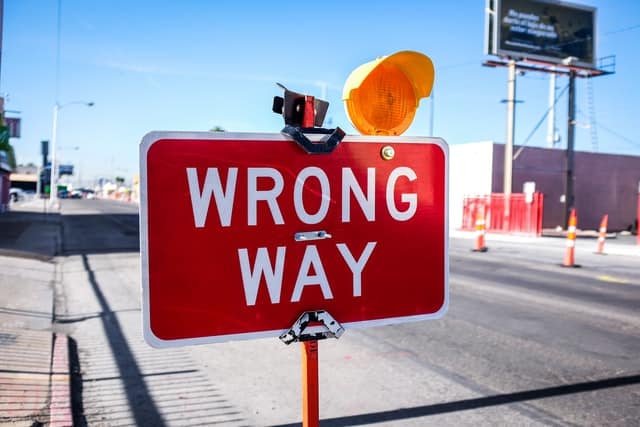
George: Yeah.
So do you think, going back to 2008, if we would have let free markets work and if we would've let entities go bust, then today, now that we're dealing with COVID…
We'd be in a much stronger position economically?
Danielle DiMartino Booth: Absolutely. I mean, I don't know what they call clear channel today, I don't know what they renamed Caesars. I think it's iHeart Learning, and I think they… Are they bankrupt again?
Anyways, that week we, because I was we at the time, I got my pronouns straight. I was inside the Fed when they were doing this.
But so many dead companies were kept alive in the last crisis that we're still dealing with them today. And we're not in a position of strength, as a result, and we're doubling down on that failed strategy?
Because that's the Fed's doing, and that's okay if you can guarantee a recovery.
But getting money into the bottom third of income earners and keeping your buddies at the country club flush and whole is not going to prevent the recession that he's trying to prevent because you cannot print jobs and you cannot print cashflow.
George: Production.
Danielle DiMartino Booth: You can't print small businesses staying in business.
There are certain things he can't do. So the experiment we're talking about worked in '08, '09 because we were able to come into a recovery.

But the COVID is different. It's like your every 100-year thing, and you don't have China that went in and out of recession in a heartbeat.
Back then they pumped $858 billion into its economy, came roaring back, and continued to urbanize and build out the global auto sector and pump up manufacturing in Germany and keep world trade going.
You don't have China as this marginal engine of growth to support the entire global economy this time.
They're on their knees with growth at a 30 year low and a lot of enemies around the world.
So there's only so much that the same central bankers can do, so we're not going to be able to see to the other side. I think this is going to be a long-drawn-out default process where you're going to keep these companies in business, but they're still eventually going to go.
George: Yeah, right.
I would ask how much did we recover if they had to keep interest rates at 0% for eight years and take the balance sheet to 4.5 trillion and they can't do QT without the whole thing blowing up and repo rates going to 10%, and I don't know how healthy that was.
Danielle DiMartino Booth: No, but I do know bankers say that they don't have to do repo operations anymore.
And I'm like, “Well, no, because you created reserves. So don't pat yourself on the back there, genius.”
We're [inaudible 00:28:41] QE because we're doing real QE and I'm like, “Aha, you didn't want to call it QE then, but now you're really proud of it and you're trying to do as much of it as you can.”
This is just asinine, George.
George:
It also seems that if they achieve their objectives, which let's just call it inflation.
That also creates the kryptonite for them in the sense that if the only thing they can do is print money or lower interest rates, if you get inflation or stagflation like we had in the 1970s, then the Fed is impotent.
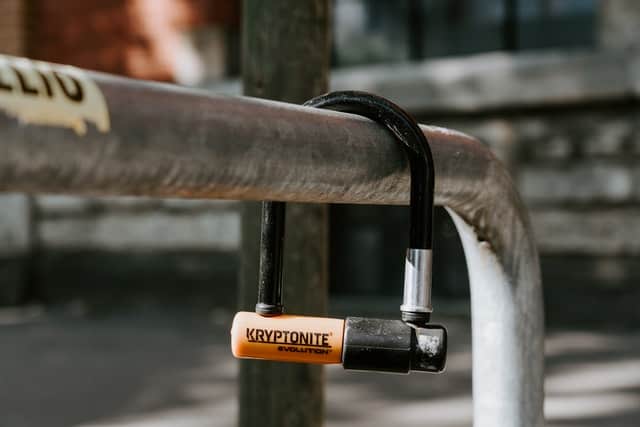
They can't do anything, they have no tools. All they can do is sit back and watch.
Either that or go Volcker. I think even Volcker said before he passed that to do what he did in 1980 or '81 now would be completely impossible.
Danielle DiMartino Booth: I mean, overnight you would have commercial real estate be a global and systemic crisis, a rising interest rate environment.
Global real estate would be at the lead of what is going wrong. Forget about refinancing and the fact that I think in the first quarter we hit $325 trillion of debt worldwide.
You would have serious problems in real estate under such a scenario, and you've already got serious problems in real estate.
The Real Estate Market: Waiting For The Silver Tsunami

George: Yeah. Well, let's go into that because that was one of my talking points.
I know a lot of people, they love the macro, they love finance, they love investing, but almost everyone has a home or they've got a roof over their heads, so that's applicable to the average Joe and Jane, and you are lot of research on that.
So tell me your thoughts on the real estate market.
Danielle DiMartino Booth: 40% of people have a home. About 38% of people have a home in the sense that they own it outright, so all they have to do is pay property taxes.
But let's do air quotes because all they have to do is pay property taxes is going to be a whole different proposition in the land of tomorrow. 60% of people have a mortgage.
There are 38 million Americans who are over the age of 65 who own a home. And literally on February the 19th, you can't make this up, the day that the stock market peaked, Zillow put out a huge report on this cohort of home-owning Americans, a much greater percentage of whom own their homes outright, and it's called the Silver Tsunami.
The report that Zillow put out said that we were going to have these friendly waves as the boomers and the silent generation, the older ones, we're going to have these friendly waves of selling going into the years to come.
And that there's an acute shortage of supply problem was going to gently be resolved as the older people downsized and sold their homes, and it was going to be so nice and organized.
If you look at Bloomberg Consumer Comfort, if you look at consumer sentiment among the highest earners, if you look at consumer sentiment among the oldest Americans, despite the fact that the stock market has rebounded, their sentiment has not.
They're old enough to say, “I see what you're doing in Washington. It's really going to end badly.
The minute I feel safe enough to have an open house or go move in with my kids so that I can have an open house, I don't trust what is happening in the stock market.
I don't trust what is in my IRA anymore, I'm getting the equity out of my house.” And it's not going to be nice undulations, it's not going to be organized.

It's going to be all of them getting out there at once and listing their homes.
So we had had five consecutive weeks of decent recovery in purchase activity in the US housing market.
Okay… You can't tell me that pre-COVID there were not a bunch of people looking to the spring selling season with a need to buy a home.
That's just a natural progression, where you've got 156 million people in the workforce.
People are going to relocate, people are going to move, people have had more kids, people need to upsize, people need to downsize.
So you had a certain amount of activity that was sitting in the pipeline that had to be satisfied.
But my question is, once the entire country has reopened and you've got all of these senior citizens listing their homes … and I'm being told this is not going to happen.
Their confidence is telling me it is going to happen, that they're not buying the rally in the stock market enough to say what they said 10 years ago.
Danielle DiMartino Booth: What they said 10 years ago was, “I can stay in the workforce for another decade. I'm just in my 60s.”

The boomers. ‘I can keep working, I like my big house. I'm not so sick that I need to be close to a hospital.
I can stay out here in the boonies in my mansion. I can afford to maintain it.”
All of this calculus is going to be stuck on its head because the same generations now, 10 years older, are they going to say, “Well, I'm 75 so I can easily work until I'm 85?”
You had 1.2 million people, 65 and older, in March payrolls lose their jobs.
That I would argue is going to be a permanent job loss, because they're going to be other people who are going to rush to take those open positions, who employers are going to hire because they're cheaper than the senior citizens were.
Again, you're going to have older Americans with the need to sell their homes, which we've never had despite the biggest generation …
Now, the millennials are bigger. Despite this biggest generation potentially having to have gone that route 10 years ago, they didn't.
The stock market rebounded, quantitative easing was a brand new thing, the rally came roaring back, the rebound was swift, they had a tripling of off-the-lows in their stock and they were able to hold on.
That's not going to be the case going forward for residential real estate in America, and you've had millennials as a generation lose proportionately more jobs than any other generation post-COVID-19.
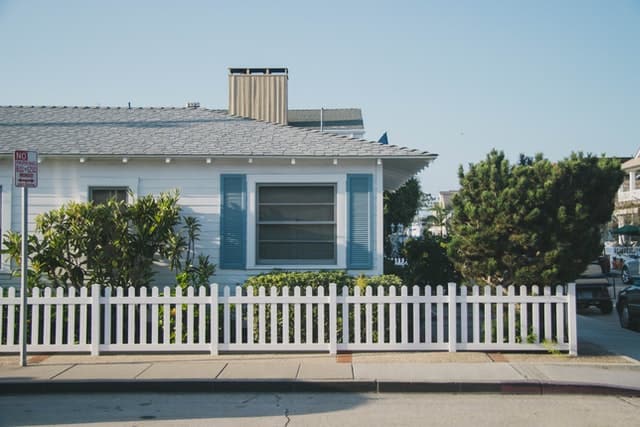
And they have kids, they need homes, they need to buy the millennials homes, but they're in a worse situation financially than they were in pre-COVID.
George: Right, and prices are sky-high.
Danielle DiMartino Booth: They will afford less home than they could before, and the seniors are going to put their big mansions on the market for high prices? No.
The divide has to be closed by prices coming down, such that you put the willing buyers in touch with the willing sellers.
Are The Real Estate Nominal Prices Going Down?

George: Right. Yeah, okay.
So you see nominal prices coming down over the next, call it, two or three years?
Danielle DiMartino Booth: One of my dearest friends, Michelle Meyers, Chief Economist at Bank of America, we go back many years, and she was the biggest housing bill on the street coming into this.
She's saying home prices are going to fall by 2.3% by the end of 2021. I mean, it's probably like chewing on glass to write that.
But if the biggest bull thinks that nominal prices are going to come down by the end of 2021, what does that imply for the overall market?
Again, we are seeing activity, but we have not seen the second wave of white-collar layoffs start to come through.
But when you say 25% of Victoria's Secret stores are not going to open, when you have entire companies like Pure One liquidating, you start to see that it's not just the sales clerk at stores losing their job.
It's people who collect salaries, managers.
Again, this will have a secondary effect on demand for housing coming through if you're higher income earners start to also become part of the ranks of unemployed.
I have to reference it: 43.7 million Americans have applied for initial state unemployment claims or the special unemployment claims that are for gig workers, self-employed, contract workers that were part of the CARES Act.

28% of the United States workforce has applied for unemployment insurance. You cannot tell me that's positive and bullish for residential real estate.
George: Right. I always use a chart of housing going all the way back to 1900 adjusted for inflation.
It shows that if you go from 1900 to the late 1990s, the average home really didn't increase in price, it just increased with inflation when you adjust for the size of the home.
But of course, in 2006, it just skyrockets, and then we're right back there right now. So naturally, you'd think that prices would have to come down to their historic trend line either in nominal terms or in real terms.
So I think the question most people have is:
Is this going to be a gradual decrease in prices or is it going to be a complete crash due to this excess supply, maybe because of private equity selling all of the rental homes they own, or Airbnb people?
Who knows? If it is going to be a crash, how long does that usually take?
Danielle DiMartino Booth: It's so impossible to say because we've never … not even during the housing crisis.
Even during the housing crisis, mortgage mitigation efforts slowed the process. But the confluence of events … invitation homes just pulled their guidance.
Every biggest investor, everybody's saying it's going to be fine but we've never had three separate cohorts, second homeowners, Airbnb people with five mortgages, the Silver Tsunami I just mentioned, potentially investors. You've never had this many different cohorts of home buyers need to come out and sell at once potentially.
 I can't see it being gradual in the way that it has typically been. We've seen a very
I can't see it being gradual in the way that it has typically been. We've seen a very
expedited credit cycle in corporate bonds, and normally that takes much longer to play out.
You've got credit rating agencies working 24/7 trying to keep the downgrades going. I can't see there not being some expediting of the process in commercial real estate.
George: In commercial?
Danielle DiMartino Booth: Excuse me, residential real estate. Sorry. Commercial real estate too. But yes. Both, they're attached to each other, right?
Because you have all these high and multifamily developments as well, and everything that's been developed in the current cycle, 82% of homes have been luxury as well.
Again, you've got millennials that are out of work. There's too many disconnects.
On Gold, Silver, And Bitcoin
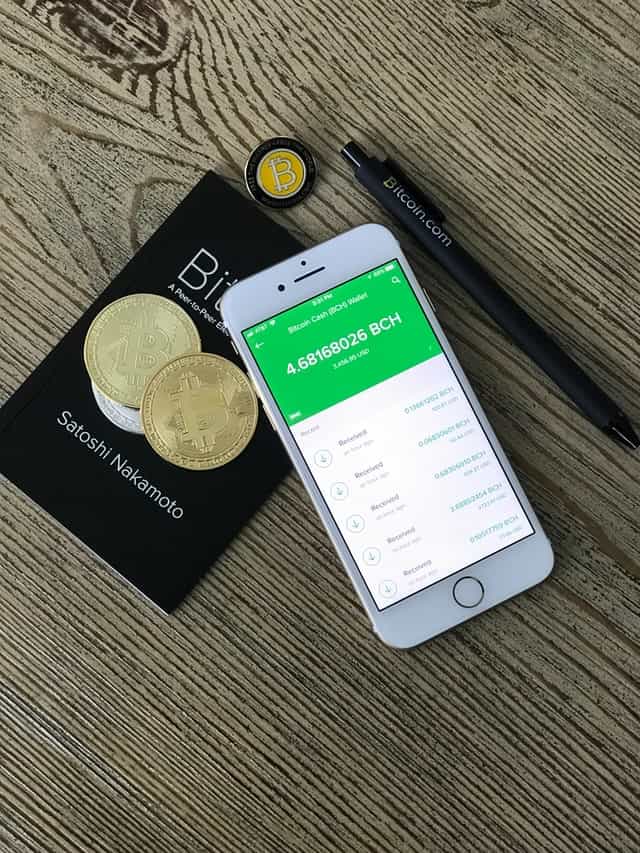
George: Right. Yeah, I totally understand what you're saying. It's great.
Now I know you're pressed for time. I appreciate your generosity so far.
I just got one last question for you that I know all or most of my viewers are really interested in. What are your thoughts on gold, silver, and Bitcoin?
Danielle DiMartino Booth: I'm not a crypto expert because I still have PTSD from working at the Fed.
And I know that because China, Russia, and Venezuela were the first three countries to roll out the idea of the sovereign so they could spy on their people. Then the Bank of England had to jump in.
There is an inevitability of having a sovereign cryptocurrency in the future, even in the United States. So because of that inevitability, I look at Bitcoin as being a temporary holding spot, if you will. But boy, do I own gold and silver.
George: Right. Okay. Awesome. Well, Danielle, thank you very much again.
For my viewers who want to find out more about what you do or your research, where should they go?
Danielle DiMartino Booth: They should go to Quillintelligence.com. I had this made for COVID.
I don't go to the studios anymore. Go to Quillintelligence.com
We've actually got a retail product, but it's truly institutional, 50 bucks a month, best money you'll ever spend. If you've got insomnia, @DiMartinoBooth.
Some people say I never sleep. I do, but I do tweet in my sleep. So follow me @DiMartinoBooth as well.
George: All right, Danielle, thank you very much, and I can't wait to do it again.
Danielle DiMartino Booth: Thanks. Likewise. Take care. Be safe.

